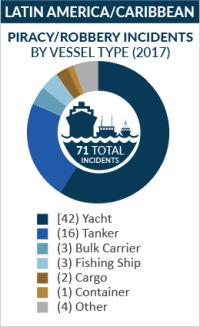
Graphic: OBP
The southern Caribbean has seen a significant increase in piracy of late, at least partially related to the economic and political turmoil in nearby Venezuela. Commerical ships, local fishermen and visiting yachts have all fallen prey to attacks from pirates. Oceans Beyond Piracy (OBP), a project of the non-profit One Earth Future, reports that piracy and armed robbery against ships in the Caribbean and Latin America in 2017 rose to 71 incidents, as compared to 27 in 2016, an increase of 163%.
According to OBP, of the 71 attacks, 42 were directed against yachts, 16 against tankers and bulk carriers, 3 against fishing vessels and 7 toward other cargo vessels. 63 of the attacks were while vessels were at anchor in territorial waters. Anchorages in Venezuela, Saint Vincent and the Grenadines, Colombia and St. Lucia have been regional hotspots for pirate attacks.
The violence may be increasing. In April, a pirate attack on four fishing vessels off the coast of Suriname left at least a dozen dead or missing. A month later, a fishing boat captain was shot dead after his vessel was attacked off Suriname.
The Washington Post reports: There have been reports of piracy over the past 18 months near Honduras, Nicaragua, Haiti and St. Lucia. But nowhere has the surge been more notable, analysts say, than off the coast of Venezuela.
An economic crisis in the South American country has sent inflation soaring toward 1 million percent, making food and medicine scarce. Malnutrition is spreading; disease is rampant; water and power grids are failing from a lack of trained staff and spare parts. Police and military are abandoning their posts as their paychecks become nearly worthless. Under the socialist government of President Nicolás Maduro, repression and corruption have increased.
There are fears in the region, that it the economic and political crises in the Venezuelan grow worse that the pirates may be tempted to range further out to sea – as their Somali counterparts began doing a decade ago.
